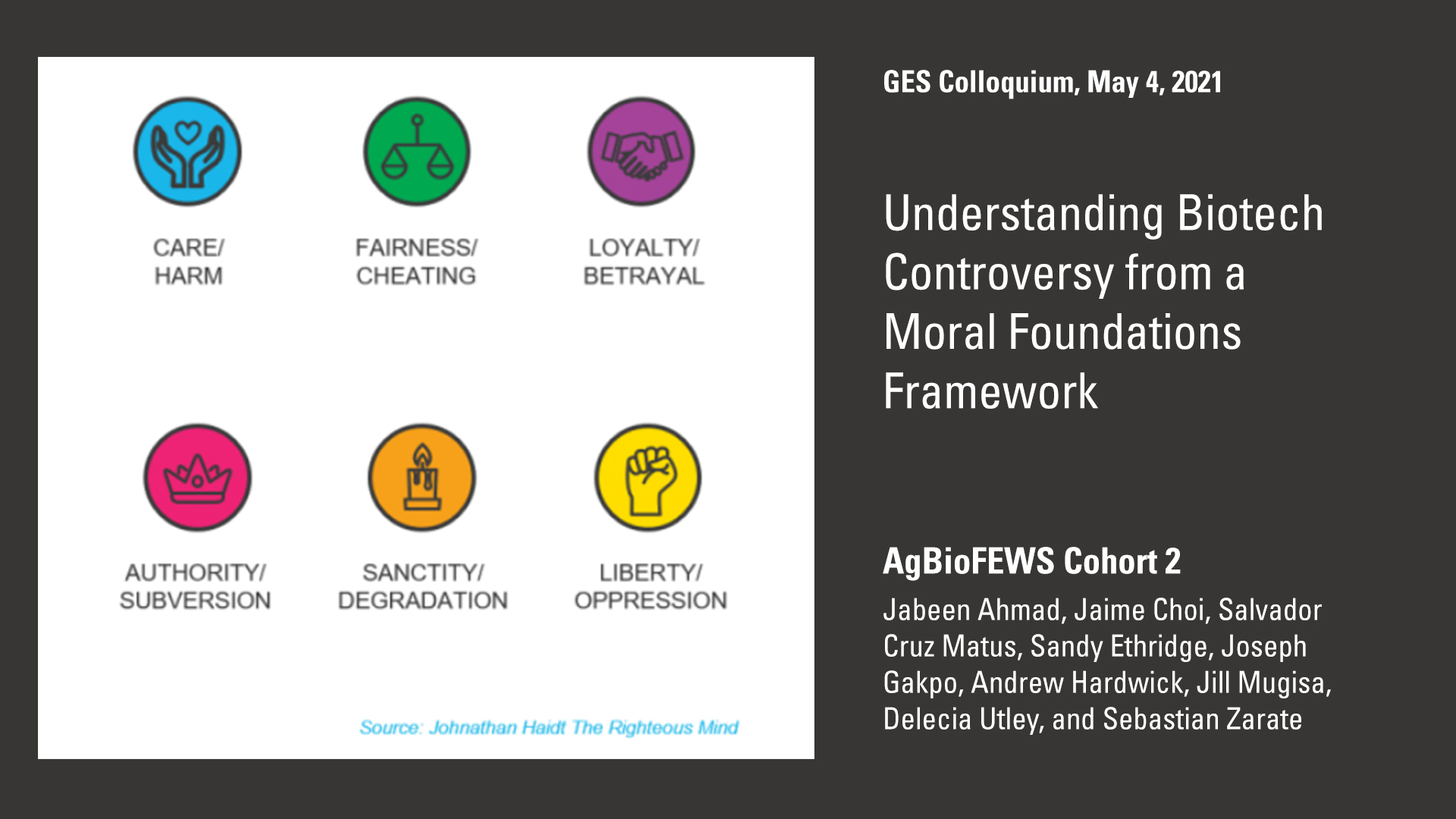
- This event has passed.
AgBioFEWS Cohort 2 Group Project | GES Colloquium (Zoom)

GES Colloquium Home | Zoom Registration | GES MediaSite | Video Archives | Podcast | @GESCenterNCSU | Newsletter
Understanding Biotech Controversy from a Moral Foundations Framework
Speakers: AgBioFEWS Cohort 2
Website | Twitter: #AgBioFEWS
During the Emerging Technologies and Society course this Spring, the AgBioFEWS Cohort 2 studied the challenges of managing scientific controversy. The fellows examined controversies surrounding the Golden Rice Project, GMO labeling (Measure 92) in Oregon, the American Chestnut, and the Oxitec Mosquito. In each of these cases, the Moral Foundations (MF) Framework, developed by Johnahan Haidt and a group of psychologists, was applied to understand the morals and values underlying stakeholder perspectives. While moral foundations are utilized by nearly all, stakeholders may lean towards different moral foundations or rely on some more heavily than others, creating scenarios for conflict to emerge. Sometimes, even diametrically opposed arguments are based on identical moral foundations. In Cohort 2’s final project, consumer preferences with respect to the labeling of gene-edited foods was examined using the MF framework. Expert stakeholders from academia, non-profit, advocacy and industry were invited to provide their insights on the labeling of gene-edited foods. Analysis of expert stakeholder perspectives combined with class case studies on biotechnology controversies led to an exploration of ways to understand and manage controversy. We argue that the MF framework offers a new way for the Genetic Engineering and Society Center to understand and find solutions to controversies in biotechnology.
WordPress database error: [Unknown column 'wp_tec_occurrences.start_date' in 'SELECT']SELECT SQL_CALC_FOUND_ROWS wp_posts.*, CAST( wp_tec_occurrences.start_date AS DATETIME ) AS event_date
FROM wp_posts LEFT JOIN wp_term_relationships ON (wp_posts.ID = wp_term_relationships.object_id) LEFT JOIN wp_postmeta ON ( wp_posts.ID = wp_postmeta.post_id AND wp_postmeta.meta_key = '_EventHideFromUpcoming' ) LEFT JOIN wp_postmeta AS mt1 ON ( wp_posts.ID = mt1.post_id )
WHERE 1=1 AND wp_posts.ID NOT IN (15865) AND (
wp_term_relationships.term_taxonomy_id IN (149,521,802)
OR
wp_term_relationships.term_taxonomy_id IN (45,47)
) AND (
wp_postmeta.post_id IS NULL
AND
( mt1.meta_key = '_EventStartDate' AND CAST(mt1.meta_value AS DATETIME) >= '2026-02-14 01:22:57' )
) AND wp_posts.post_type IN ('post', 'page', 'attachment', 'tribe_venue', 'tribe_events', 'tribe_event_series') AND ((wp_posts.post_status = 'publish'))
GROUP BY wp_tec_occurrences.occurrence_id
ORDER BY event_date ASC, wp_posts.post_date ASC
LIMIT 0, 3